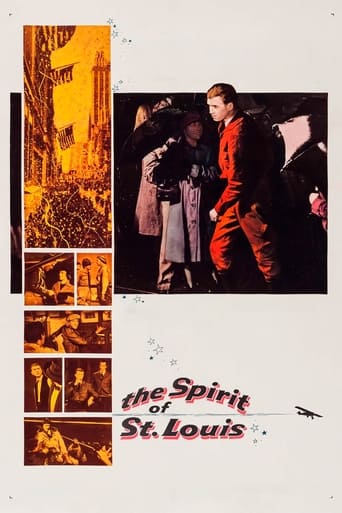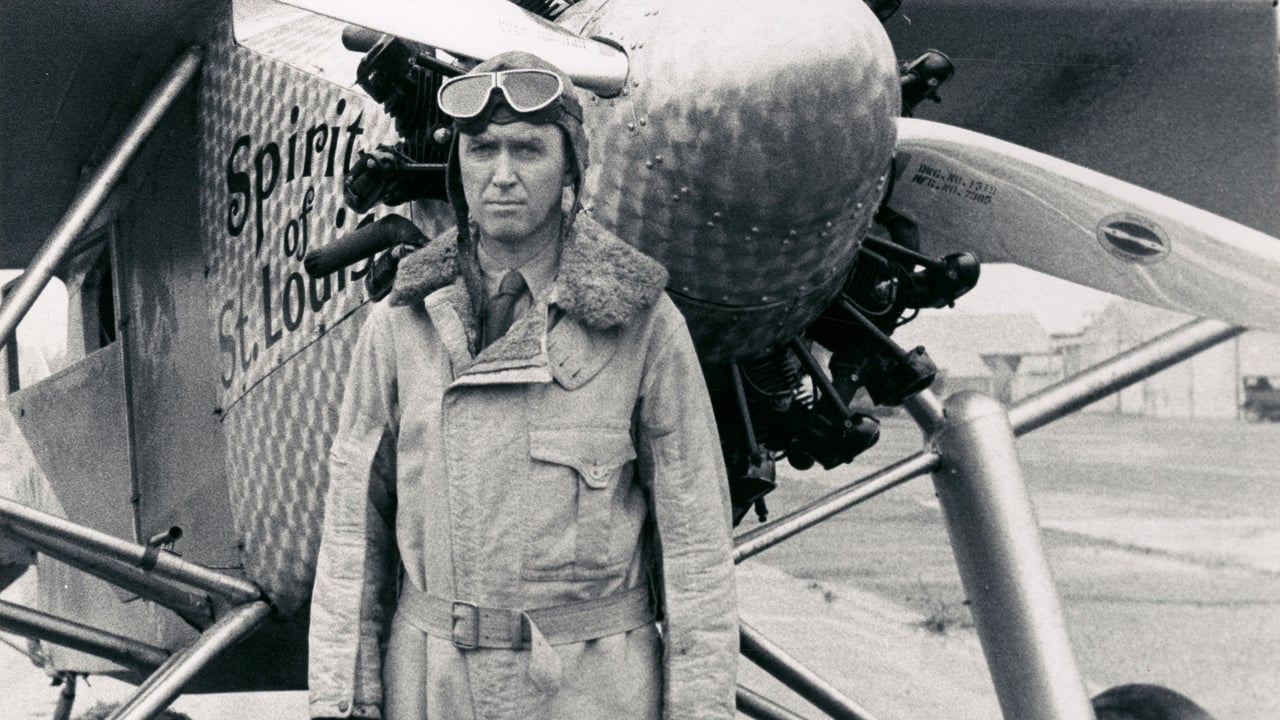jacobs-greenwood
Directed by the great Billy Wilder (surprisingly), and based on the book by Charles Lindbergh which was adapted by Charles Lederer (the director wrote the screenplay with Wendell Mayes), this slightly above average if overlong biographical drama tells the story of the man who would one day become the first to fly non-stop from New York to Paris in 1927. This historic first transatlantic flight helped to create the airline industry.James Stewart (again, surprisingly; he was nearly 40, but portraying a man 25 years old) plays this man, Charles Augustus 'Slim' Lindbergh, whose plane (designed and built by Ryan Aircraft in San Diego, California) was dubbed "The Spirit of St. Louis (1957)", for the businessmen from that city that helped to fund the effort. The story tells about Lindbergh's early life as a brave mail carrying pilot in the early days of aviation (though there's no real drama about whether he survived in the fog).But much of the film's 'action' involves the history making flight itself, with actor Stewart's voice providing narration for his character's thoughts, while he tries to stay awake during the 30+ hour journey.This movie received an Academy Award nomination for its Special Effects, representing the only Oscar nomination for Louis Lichtenfield. Murray Hamilton, Patricia Smith, Bartlett Robinson, Marc Connelly, Arthur Space, and Charles Watts play the other, minor, credited roles.
moonspinner55
A mail-run pilot gets help financing the construction of a plane to cross the Atlantic from New York to Paris in 1927--with he himself alone at the controls. Director Billy Wilder, who also co-adapted Charles Lindbergh's memoir with Wendell Mayes and Charles Lederer, isn't quite able to work his customary high-toned humor into these proceedings, but his adroit pacing is certainly in evidence. James Stewart carries off the leading role without a hitch, and the final moments are surprisingly emotional. Not a dashing, robust picture, but an earthy, squirrelly film about human endurance and, indeed, spirit. There's a beautiful, seemingly throwaway moment with Stewart flying over Ireland and scaring the sheep, the shadow of the plane on the ground below as seen from Lindbergh's window. Technical details such as this make a tangible connection with audiences; one leaves the picture feeling uniquely satisfied. Supporting cast is workman-like; Stewart and the plane are the drawing cards. *** from ****
blanche-2
Jimmy Stewart is Charles Lindbergh in "The Spirit of St. Louis," a 1957 film directed by Billy Wilder and based on Lindbergh's book about his transatlantic flight.The film deals with little else but Lindbergh's career up to and including his monumental flight from Roosevelt Field to Le Bourget in France in 33 hours back in 1927. We see Lindbergh as a mail pilot, then attempting to raise funds to buy a plane, though a plane ended up being built by a small aircraft company. And then the flight itself - and Wilder somehow makes it suspenseful and interesting. He really captures the pilot's complete isolation with no copilot or radio, talking to himself (Stewart provides the narration), sleep-deprived, with only the sound of the plane for company, falling asleep at the wheel, and finally, unsure where he was and using map topography to figure it out. It's an amazing story. During the flight sequence, there are flashbacks to earlier points in Lindbergh's life.The Spirit of St. Louis is replicated, and once seen, it's very hard to believe it got out of Roosevelt Field. Lightweight, Lindbergh made sure it carried only the absolute essentials and refused to even bring a parachute or radio because of the extra weight.Today, for me anyway, James Stewart is just James Stewart, one of the great film stars and actors. I'm blissfully unaware of his age most of the time, and I was in this film as well. For me, he was tall, lanky Lindbergh, determined to succeed and very likable. I realize that John Kerr was offered the role first, but if he had taken it, the film would have flopped initially, as it did starring Stewart, due to the huge budget, but I don't believe it would hold up as well as it does today.Heroes are very rarely discussed as human beings, and many of their words and actions are taken out of context and out of the era. Lindbergh was ahead of his time in his environmental and aeronautical pursuits and very much of his time in some of his political beliefs. And as we now know, fidelity wasn't one of his strong points. Reading an excellent, well-researched biography like Scott Berg wrote is preferable to making snap judgments. Hindsight is easy. Complicated men have complicated lives. You don't achieve what Lindbergh did in the Spirit of St. Louis by being ordinary. Wilder does an excellent job in showing his crowning achievement, and in evoking the excitement people felt at the time.
deschreiber
It's utterly amazing to me that Hollywood made an upbeat treatment of the life of Charles Lindbergh, beating the drums for a great man. Yes, his accomplishment of being the first to fly solo across the Atlantic Ocean was sensational, and the later tragic kidnapping and murder of his children elicited tremendous sympathy for him. But during the years leading up to World War II Lindbergh threw away all the goodwill he had built up in his life as he toured America giving Nazi-like speeches, extolling the superiority of the "Nordic" (Aryan) white race and the need for better 'breeding' of humans (eugenics) and making excuses for Hitler's broken promises and early conquests in Europe. A few examples give the flavour of his way of thinking."We can have peace and security only so long as we band together to preserve that most priceless possession, our inheritance of European blood, only so long as we guard ourselves against attack by foreign armies and dilution by foreign races." "We must limit to a reasonable amount the Jewish influence...Whenever the Jewish percentage of total population becomes too high, a reaction seems to invariably occur." For him the survival of the white race was more important than the survival of democracy in Europe: "Our bond with Europe is one of race and not of political ideology." He considered Russia to be a "semi-Asiatic" country compared to Germany, and he found Communism to be an ideology that would destroy the West's "racial strength" and replace everyone of European descent with "a pressing sea of Yellow, Black, and Brown."Wikipedia has lots more evidence of Lindbergh's repugnant views.Why did Hollywood in 1957, long after his ugly side was fully revealed, choose to paint this poor example of a man as a national hero? Sticking with the truth, that is, the whole truth, they could have made a great movie portraying a man of wonderful daring and accomplishment yet with profound moral flaws, a public hero with a streak of sinister, racist, totalitarian evil.Good-hearted, homespun, unambiguously good-guy James Stewart is exactly the wrong actor to portray Charles Lindbergh.



 AD
AD



